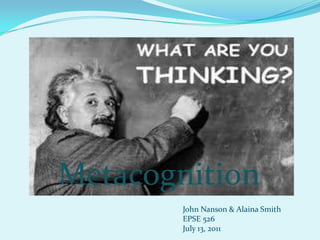
Metacognition2 e
- 1. Metacognition John Nanson & Alaina Smith EPSE 526 July 13, 2011
- 2. Definition The term metacognition is used to refer to the deliberate conscious control of ones own cognitive actions (Brown, 1980), that is, cognition about cognition: thinking about thinking (Wray, 2002). Metacognition is not a new idea, in 1962 Vygotsky suggested that there are two stages in the development of knowledge: firstly, its automatic unconscious acquisition and secondly, a gradual increase in active conscious control over that knowledge.
- 3. Metacognitive Process self-assessment questioning monitoring clarifying directing understanding connecting
- 4. How is this different from other teaching strategies? Experience/kn Assumptions about what Metacognitive owledge of the students Observed strategies person understand Practices: incorporate of metacognitive instruction is to assist students to identify and The focus an awareness of: enlist strategies to promote and monitor learning.
- 5. Metaliteracy Wray suggests that literacy experiences need to be meaningful and purposeful from the child’s point of view…….this often requires explicit instruction and modelling from the teacher We do not need to wait for students to become more mature and more self-aware, with supportive teacher behaviour, children can engage in metacognitive operations like comprehension (Palincsar & Brown, 1984) and revision (Fitzgerald, 1987) at a much higher level.
- 6. Teacher modelling – shared writing……… Shared writing provides teachers opportunities to: work with the whole class, to model, explore and discuss the decisions that writers make when they are writing make links between reading and writing explicit: demonstrate how writers use language to achieve particular effects focus on particular aspects of the writing process, such as planning, composing, revising or editing
- 7. Think aloud……….. Shared thinking provides opportunities for teachers and students to: Make predictions about text Make text connections Ask questions about text as they read or listen (monitoring and clarifying) Reflect on reading (discussion, asking questions, sharing insights)
- 8. Reciprocal teaching……….. Reciprocal teaching provides opportunities for students to: Take on the role of the teacher Lead small groups Ask questions, summarise, predict and clarify what they have read This strategy requires extensive modelling for students.
- 9. Summary Research evidence in It may be that a key metacogntion (and to enhancing how to measure it) is children’s abilities in incomplete but there literacy is to develop are several teaching their abilities to be strategies that may be more ‘aware’ of their beneficial in helping literacy processes students develop their literacy skills
- 10. Connections Explicit careful instruction analysis of of the task at Instruction Vygotsky, ZPD, social strategies aspects of learning hand regarding the generalized use of the strategies. Feedback on the identifying Common usefulness of the Personal strategies that elements strategies and the experiences as a will promote amongst articlessuccess with “why” child successful on metacognitionwhich they are task being used. completion
- 11. Thoughts…… Too rarely is the individual teacher so free from the dictation of authoritative supervisor, textbook on methods, prescribed course of study, etc., that he can let his mind come to close quarters with the pupil’s mind and the subject matter. -John Dewey, Democracy and Education (1916) What children can do with the assistance of others might be in some sense even more indicative of their mental development than what they can do alone. -L. S. Vygotsky, Mind in Society (1978) http://www.youtube.com/watch?v=xS_Ftio1ops&feature=player_detailpage
- 12. Connections Acting Divergent Converging Thinking “My experience is what I agree to attend to” Reflection ( William James) Experience Accommodating Assimilation
- 13. Final Thoughts…. “Pedagogy must be oriented not to the yesterday, but to the tomorrow of the child’s development. Only then can it call to life in the process of education those processes of development which now lie in the zone of proximal development” (Vygotsky, 1993, pp. 251- 252). http://www.youtube.com/watch?v=FvyZ sSQ3ul4&feature=player_detailpage
- 14. References Kold, A., et al. (2009). The learning way: Meta-cognitive aspects of experiential Learning. Sage Publications, 40(3). Palincsar, A.S., & Brown, D.A (1987). Enhancing instruction time through attention to metacognition. Journal of Learning Disabilities, 20(2), 66-75. Sternberg, R.J. (1998). Metacognition, abilities, and developing expertise: What makes an expert student? Instructional Science, 26(1), 127-140. Vygotsky, L. (1993). The collected works of L. S. Vygotsky, Vol. 2: 77 fundamentals of defectology. R.Rieber & A. Carton, Eds., J. Knox & Stevens, Trans. New York: Plenum. Wray, D. (2002). Metacognition and literacy. In G. Reid & J. Wearmouth (Eds.), Dyslexia and Literacy. London: Wiley.